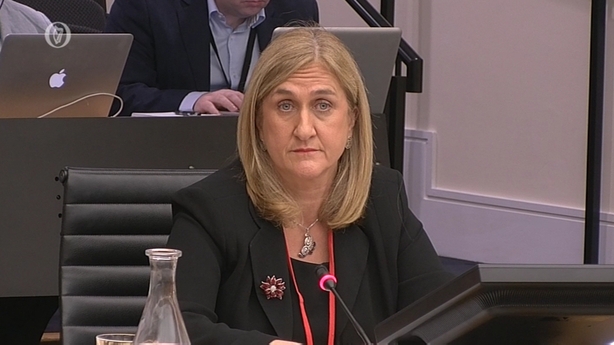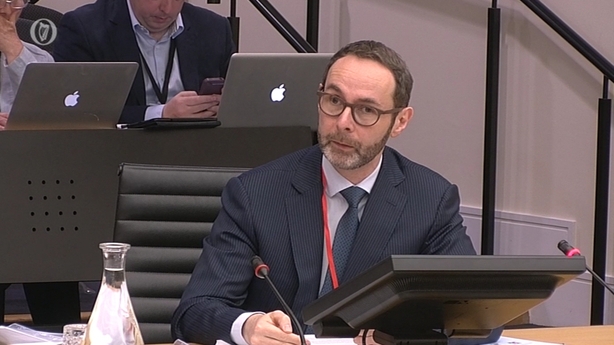The Central Bank's former head of economics has sharply criticised his former employer at the banking inquiry.
Tom O'Connell said the bank's warnings were watered down, the governor was too close to the Department of Finance and they were unwilling to take unpopular decisions.
Mr O'Connell questioned whether the governor would really act independently and take unpopular decisions, given his history at the Department of Finance.
He also said the boards of the Central Bank and the Financial Regulator were heavily weighted with political supporters of government.
He said staff concerns were invariably watered down when aired publicly so as not to reflect adversely on matters of concern to government.
He told the inquiry that warnings in the Financial Stability Reports were buried in the main body while the overall assessment and tone was reassuring which reflected the views of the two Boards - talking of a soft landing.
He said Ireland's banking and economic crash should never have happened and should never have been allowed to happen.
At the highest level, there seemed to be a blindness to the fact that there had been a whole series of recent property-related bank crashes, he said.
He also said that those who suggest that the Lehman Brothers collapse caused Ireland's crash were almost wholly wrong, and were merely seeking an external scapegoat.
Stream provided by HEAnet
Former regulator says organisation was in crisis
A former acting financial regulator has told the banking inquiry that when she took over in the 2009, the organisation was in crisis and it was an extremely difficult time.
Mary O'Dea said staff were filled with doubt and "working all hours" to stabilise the situation.
She said there was a feeling of blame that the Central Bank should have seen the broader systemic issues and the Financial Regulator should have seen the micro-prudential issues.

Ms O'Dea was acting chief executive of the Financial Regulator for one year from January 2009 to January 2010.
Before that she was consumer director at the Regulator from 2003 to 2008.
Fine Gael TD John Paul Phelan asked whether her attendance at a function with bankers, six weeks after the bank guarantee, was ill-judged.
Ms O'Dea said the timing was difficult but she attended many different functions and they did not affect her ability to do her job or compromise her integrity.
Ms O'Dea said they introduced tougher mortgage rules in 2007, but it was too late and consumers suffered.
Chairman Ciarán Lynch asked what she did to stop people borrowing multiples of their incomes, extending home loans over longer terms and taking out 100% mortgages.
Ms O'Dea said they introduced a legal rule in 2007, but that was too late and it should have been brought in earlier.
She said she called the full board of Anglo Irish Bank to meet the Regulator in 2009 due to concerns about a lack of co-operation.
The relationship with all banks was strained in that period, with a lot of friction and tension.
A full investigation team sent into Anglo elicited a defensive response.
She said the bank brought stenographers to inspection meetings, which had never been seen before and slowed down the process, along with claims of legal privilege.
The situation improved after the meeting with the bank's board.
In addition, the reporting of a suspicion to gardaí on the so-called back-to-back loan issue meant relations were tense with the institutions involved.
She said the actions of the Central Bank and the Regulator were not adequate and she regretted that.
Calls to the Regulator's Consumer Division increased five-fold to 500 per day, after the guarantee, with customers worried about their savings.
Sufficient powers now in place

The Deputy Governor for Financial Regulation at the Central Bank has said his office and the ECB now have sufficient powers to take actions against banks to avoid another banking crisis.
Cyril Roux, who was appointed to his post in 2013, gave evidence this afternoon.
Mr Roux said there are 126 people currently working in the banking supervision division, but it is estimated they need 140.
He said efforts are being made to fill the posts and pointed out that the number of people working in the area has increased significantly since the crisis.
Asked about the relationship now between the banks and the office of the regulator, Mr Roux said "we are not buddies".
He said the banks have a role to play in the economy and the regulators enforce regulations and requirements.
"We play by the book", he said.
He said the relationship is tough, intrusive and very time-consuming for the banks and the regulator, and said that is how it should be.
He said there is a professional relationship and they do not agree on everything.

